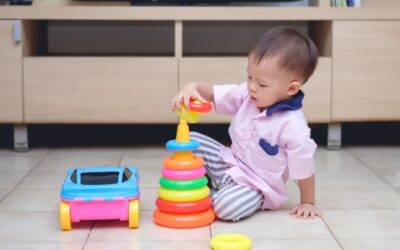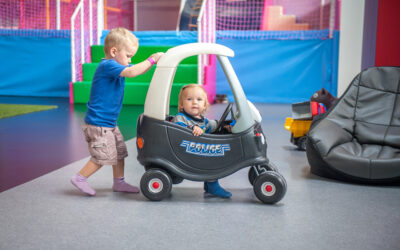Blog for Caregivers
Supporting Mothers: Find a Child Care Provider Who Supports Breastfeeding
Finding a caregiving situation that supports breastfeeding can benefit both mother and baby.
An Apple a Day: Creating a Healthy Eating Environment at Child Care
How to establish healthy eating habits through proper nutrition and an encouraging environment.
Sniffles and Sneezing: Common Childhood Illnesses and Recommendations
Learn more about the most common illnesses encountered in a child care environment.
Spread the Word: Marketing Your Child Care Program
Attract prospective clients by marketing your services within your community.
Variety of Life: Answering Questions about Personal Differences
Teach toddlers that people may look different but still have the same feelings and needs.
Eye Spy: Understanding and Encouraging the Visual Development of Infants
Help babies in your care improve visual skills by understanding developmental milestones and learning opportunities.
Be Well: Creating an Illness Policy
Put together a clearly defined illness policy so families know when children are too sick for child care.
Wrap It Up: Proper Diapering Procedures in Child Care Environments
Recommendations for ensuring a clean and safe diapering process for every child.
Choking Hazards: Don’t Let Snack Time Become a Danger Zone
Keep snack time safe by being aware of potential choking hazards.
Learning Math Basics: Fun Art Activities that Teach Numbers and Shapes
Introduce young children to basic math and geometry with fun art projects focused on numbers and shapes.
The Great Outdoors: Tips for Playground Safety
Prepare a safe environment for the children in your care to play outside.
Building Up Baby: Activities to Encourage Physical Development in Infants
Promote the physical development of infants in your care with activities that encourage growth.
Pick Me Up: How to Encourage the Development of Fine Motor Skills
Fine motor skills can be difficult to master but are an important part of exploring the world.
Beyond the Basics: Responsibilities of a Child Care Provider
Running a childcare-related business is rewarding, but also more involved than it may seem.
Scrub Up: Cleaning and Sanitizing Your Child Care
Learn how to reduce bacteria and viruses at your home child care facility.
Play It Safe: Safety Information to Provide to Parents
Help educate families about the health and wellness of children with a safety information guide.
What Big Teeth You Have: How to Handle Biting in Child Care
Reasons children bite and how to deal with these situations.
Mind Your Business: 5 Resources for Your Family Child Care Program
Improve the quality of your business by reviewing helpful professional resources.
Grow, Learn, and Play: Child Care Materials for Babies and Toddlers
Design the perfect space for learning and playing with age-appropriate materials and activities.
Helping Hands: How to Hire Employees for Your Family Child Care Business
Learn how to identify and hire qualified candidates to help with your family child care program.
We Want You: Getting Parents More Involved in Your Child Care Program
Ideas for communicating better with parents and increasing engagement in your program.
Break the Ice: How to Help Shy Children
Help develop social confidence in shy children by gently encouraging peer interaction.
Good Help: Hiring Employees for Your Child Care Business
Find quality staff for your child care business by having high standards for hiring.
Disaster Diversion: Create a Comprehensive Disaster Preparedness Plan
Keep the children in your care safe by creating a set of procedures to follow in an emergency.
How to Handle Typical Toddler Behavioral Challenges
Teach young children how to manage their emotions and express their feelings.
The Benefits of Playing Outside
Spending time outside is an important part of a healthy and well-rounded childhood.
The Gift of You: How to Build Confidence and Self-Esteem in Children
Help the children in your care develop a positive sense of self-worth.
Follow the Rules: Dealing with Discipline and Shaping Behavior
Overcome behavioral issues by having clear rules and consequences.
The Write Stuff: Activities that Encourage Writing Skills
Young children can learn the basics of writing well before they’re able to write by learning related skill sets.
The Gift of Spirit: The Importance of Persistence
Persistence is a character trait that can be improved upon with practice. Learn how to teach young children to keep trying.
How Do You Feel? Teaching Emotional Regulation to Toddlers
Help toddlers understand and communicate their emotional experiences.
Sleep Well, Little Baby: How Sleep Affects Infant Development
New research shows that sleep affects language development and memory processing in babies.
What’s the Problem: How to Encourage Problem-Solving Skills in Babies and Toddlers
Empower young children by teaching them problem-solving skills that will last a lifetime.
All Clean: Establishing Good Hand-Washing Habits
How to maintain a healthy and safe environment with good hand-washing practices.
Explore the World: How to Encourage Independence in Infants and Toddlers
Provide a safe environment and offer opportunities for infants and toddlers to practice independence.
Celebrating Cultural Differences: Activities to Make Diverse Connections
Introduce diversity to the children in your care by creating an atmosphere of acceptance and inclusion.
Healthy Kids: Encourage an Environment of Wellness
Help prevent the spreading illnesses among the children in your care.
Get Moving: 8 Fun Ideas that Promote Physical Activity
Encourage children to participate in active play with the following suggestions.
Get Involved: Doing Community Outreach with Your Child Care
Help the children in your care make a positive impact on the community.
Keep at It: Teaching Resilience in a Child Care Setting
Teach the children in your care about the power of perseverance.
Babies and Beyond: Managing Mixed-Age Groups
Mixed-age group child care situations can have a positive impact on social development.
Let’s Talk: Maintain Good Communication with Parents
Develop a plan for how to create an open and ongoing dialogue with your parents.
Easy as 1-2-3: Activities to Encourage Counting
Use fun activities to help the children in your care understand numbers.
Managing Behavior: Teaching Self-Control to Young Children
Self-control is difficult for young children, but a skilled caregiver can help teach children how to control their actions and feelings.
Outlining Expectations: Creating Child Care Policies and Procedures
Developing a clear set of policies and procedures can help you efficiently manage your business.
Baby Playtime: Games and Activities to Engage with Infants
Help babies grow and learn by providing new opportunities for play.
Professional Child Care Development Activities in Virginia
Take advantage of educational opportunities that relate to child care.
Mother Nature: Outdoor Learning Opportunities and Activities
Take the children in your care outside to play and experience nature’s lessons.
There’s a Nap for That: Tips to Create a Peaceful Daytime Nap Routine
Help create healthy daytime sleep habits for infants and toddlers in your care.
Learn and Grow: Teaching STEM in Early Education
Make STEM subjects interesting and accessible for the children in your care.
Use Your Words: Language-Building Activities from Birth to Three
Help the children in your care learn language skills with everyday activities.
Lessons Learned: Common Misconceptions on Early Learning
Understand the research behind early learning to maximize your child’s growth and development.
Open for Business: Things to Consider About Starting a Family Child Care Business
Learn what it takes to open and operate a family child care business.
We Are the World: Providing Culturally Responsive Care
Create an inclusive and empowering child care environment by understanding cultural differences.
Play Your Way: Designing Educational Play Spaces
Create an optimal environment for learning and play with well-designed educational spaces.
Be Nice: How to Teach Kindness to Young Children
Teaching young children about caring and compassion is essential to healthy social and emotional development.
Love to Read: Early Literacy Activities
Make reading fun from an early age by encouraging literacy with pre-reading activities.
Let’s Play: Stages of Play and Appropriate Activities for Each
Children go through different phases of play, depending on their stage of growth and development.
Crying Helps: How Tears Support Emotional Development
Crying is an important part of expressing emotion and learning to communicate feelings.
You Can Do It: Teaching Toddlers Problem-Solving Skills
Problem-solving skills are necessary for early childhood development.
Different Approaches to Learning: Creating a Plan to Adapt to Learning Styles
Use a variety of learning styles to meet the needs of students as individuals.
Plant the Seed: Good Nutrition through Gardening
Expand the nutritional and educational horizons of your children by incorporating gardening into the curriculum.
Marking Milestones: Recognizing Typical vs. Atypical Behaviors in Early Childhood
A skilled child care provider should be able to recognize and accommodate atypical developmental behavior.
On the Move: Gross Motor Skill Development
Incorporate play-based activities that encourage gross motor skill development.
Art Activities Encourage Social and Emotional Development
Participating in art can help young children learn about cooperation, collaboration, empathy, and emotional regulation.
Encourage Early Literacy
It’s never too early to start fostering an appreciation of language and literacy in young children.
The Importance of Fostering Creativity
Creativity is a crucial component of childhood development that encourages problem-solving, critical thinking, and learning through play.
The Importance of Social and Emotional Development
Social and emotional skills are an integral part of developmental growth, beginning in infancy.






































































